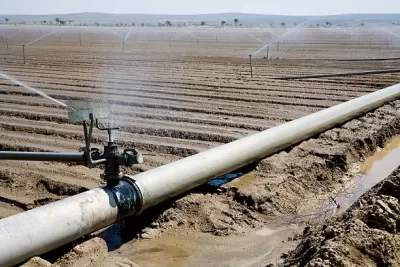Rainwater Harvesting: Integrating Sustainable Water Solutions into Plumbing
Rainwater Harvesting: Integrating Sustainable Water Solutions into Plumbing

The practice of rainwater harvesting encompasses various levels of implementation, ranging from basic rain barrels to more complex systems that integrate with irrigation or household plumbing. Its primary advantage lies in its sustainable approach to water management, rendering it accessible to individuals across different contexts.
When considering the matter, it is worth contemplating whether the utilization of municipally treated water for irrigating lawns and landscaping is necessary. Certainly not!
Rainwater that has been collected is an ideal choice for irrigation purposes, as well as for several other water-related applications. The use of rainwater harvesting devices for the provision of water to meet a portion or the entirety of our water requirements can effectively diminish our reliance on municipally treated water sources.
In general, rainwater collection is regarded as a socially acceptable and environmentally responsible technique that simultaneously fosters self-sufficiency.
Sadly, water scarcity is an increasing concern in many parts of the world. Urban areas are grappling with the effects of climate change, reduced rainfall, and increasing population. This underscores the need for sustainable water management techniques, and rainwater harvesting has emerged as a practical and environment-friendly solution.
In this article, we’ll delve into the subject and answer some pivotal questions related to rainwater harvesting.
What is the main importance of rainwater harvesting?
- Water Conservation: Rainwater harvesting aids in reducing the demand on traditional water sources. By collecting rainwater, we can conserve our groundwater reserves and reduce our dependence on municipal supplies.
- Reduced Flooding and Erosion: The process of collecting rainwater can help in preventing local flooding. When water is harvested, it is diverted from streets and pathways, which reduces the speed at which water runs off, minimizing erosion and decreasing the risk of flooding.
- Supplementing Water Supply: Especially in areas facing water scarcity, rainwater serves as an invaluable backup or supplementary source of water.
What are the benefits of rainwater?
- Natural and Soft: Rainwater is naturally soft, meaning it doesn’t contain the hard minerals found in groundwater. This makes it better for tasks like laundry, as it requires less detergent and is gentler on fabrics.
- Reduced Chemical Content: Rainwater doesn’t contain the chemicals typically found in municipally treated water, making it a purer source of water for gardening and irrigation.
- Cost-effective: Once the rainwater harvesting system is set up, the cost of collecting water is virtually nil. This can result in significant savings on water bills over time.
Why is rainwater good for the environment?
- Reduces Demand on Municipal Systems: By reducing our reliance on municipal water, we decrease the strain on local water systems and reservoirs.
- Promotes Groundwater Recharge: When rainwater is harvested and used for replenishing groundwater through infiltration pits or recharge wells, it can help in recharging aquifers.
- Lowers Carbon Footprint: Traditional water delivery systems consume energy, mainly in treatment and transportation. By using rainwater, which requires minimal treatment, we can decrease our carbon footprint.
What is the future of rainwater harvesting?
- Integration with Smart Homes: With the rise of smart home technology, we can anticipate automated rainwater harvesting systems that optimize water collection, treatment, and usage based on real-time data.
- Widespread Adoption in Urban Planning: City planners and governments are recognizing the benefits of rainwater harvesting. We can expect more building codes and policies in the future that mandate or incentivize the integration of rainwater harvesting systems in new constructions.
- Advanced Filtration Systems: As technology advances, filtration and purification systems for rainwater will become more compact and efficient, making it easier for households to use harvested rainwater for a broader range of purposes, including drinking.
Real Water Conservation Gains Require Active Use
This remark may be found all over the place: “Rainwater harvesting will help conserve water and reduce municipal water use.” While these things are true, just placing a rain barrel or cistern beneath a downspout will not achieve anything. A critical component is missing: a plan or mechanism for efficiently utilizing all of the gathered rainfall.
If rainwater is not used efficiently, the rain barrel or tank will essentially remain full. The fresh rainwater from each rainstorm will therefore just overrun the storage volume, providing no advantage to water conservation.
As a result, a genuinely successful rainwater harvesting system has a technique for utilizing the captured rainwater in a timely manner. This could be done using both passive and aggressive ways.
A distribution system that automatically distributes rainwater by gravity through a distribution pipe or tubing system could be used as a passive method. A pump system that can pressurize rainwater into an automated irrigation system would be an active method.
Rainfall collection loses its influence if you do not consider how you will use the captured rainfall.
Rainwater Harvesting Is Vital For The Future Of Sustainable Water Resources
To fulfill this need, new water delivery strategies and paradigms will be required as local water resources are pushed to accommodate population increase and economic development. Rainwater harvesting is an underutilized resource that may be exploited quickly within communities and has a huge impact. Rainwater harvesting is a component of a long-term water supply strategy for local populations.
What Is The Conclusion Of Rainwater Harvesting?
Rainwater harvesting is not just an eco-friendly fad; it’s a necessity for our ever-growing urban environments. It provides a holistic approach to water management that conserves resources, protects the environment, and provides a sustainable water source.
Integrating rainwater harvesting into our plumbing systems is a strategic move that addresses the challenges of water scarcity, environmental conservation, and financial savings. It’s an endeavor that not only benefits individual households but also contributes to the greater good of communities and the environment at large.
In conclusion, as the global population grows and our climate continues to change, solutions like rainwater harvesting will become even more vital. By integrating these systems into our homes and communities, we can pave the way for a more sustainable and resilient future.
Whether you’re considering it for environmental reasons or cost-saving benefits, rainwater harvesting is a step in the right direction for sustainable living.
Take Action with Full Spectrum Plumbing Services!
As we navigate the challenges of a changing climate and increasing water scarcity, it’s time to take action. Full Spectrum Plumbing Services is here to help you integrate rainwater harvesting systems into your home or community.
We provide quality installation services and comprehensive guidance to make your transition as smooth as possible. Make a choice for sustainable living and a resilient future.
Contact Full Spectrum Plumbing Services today and let’s make a difference together!


